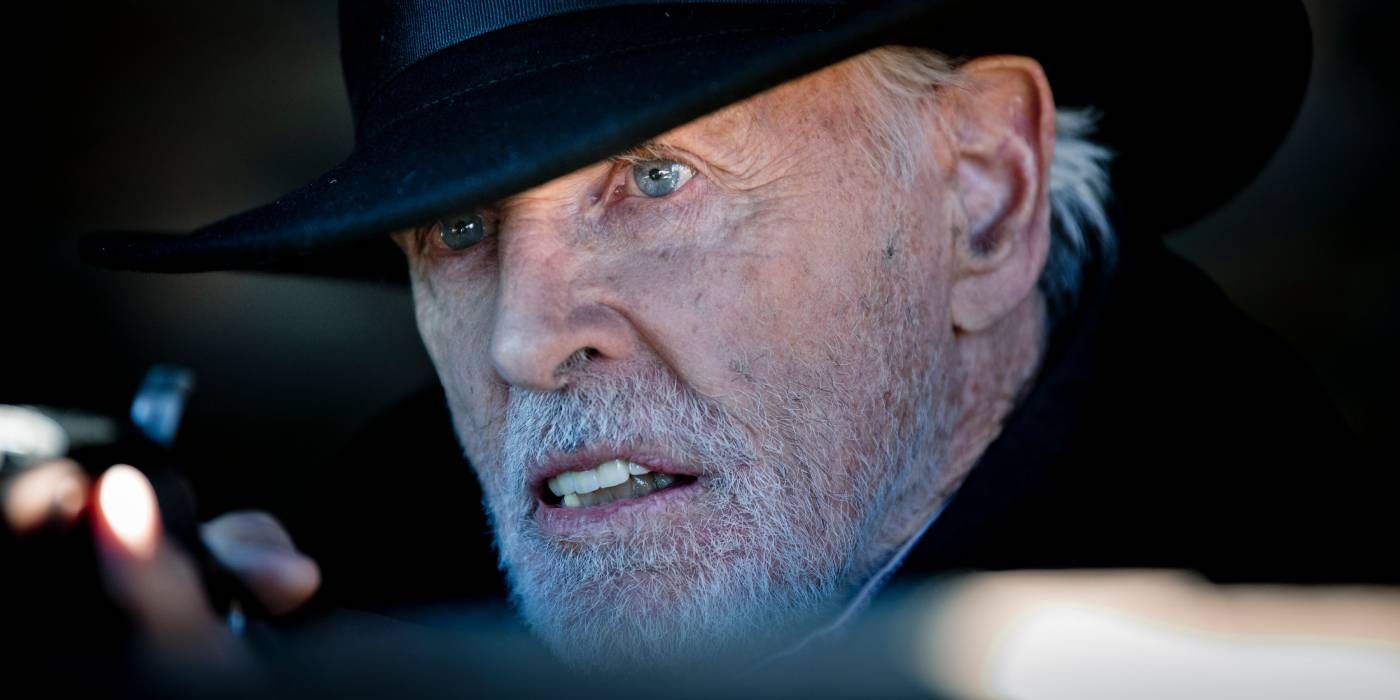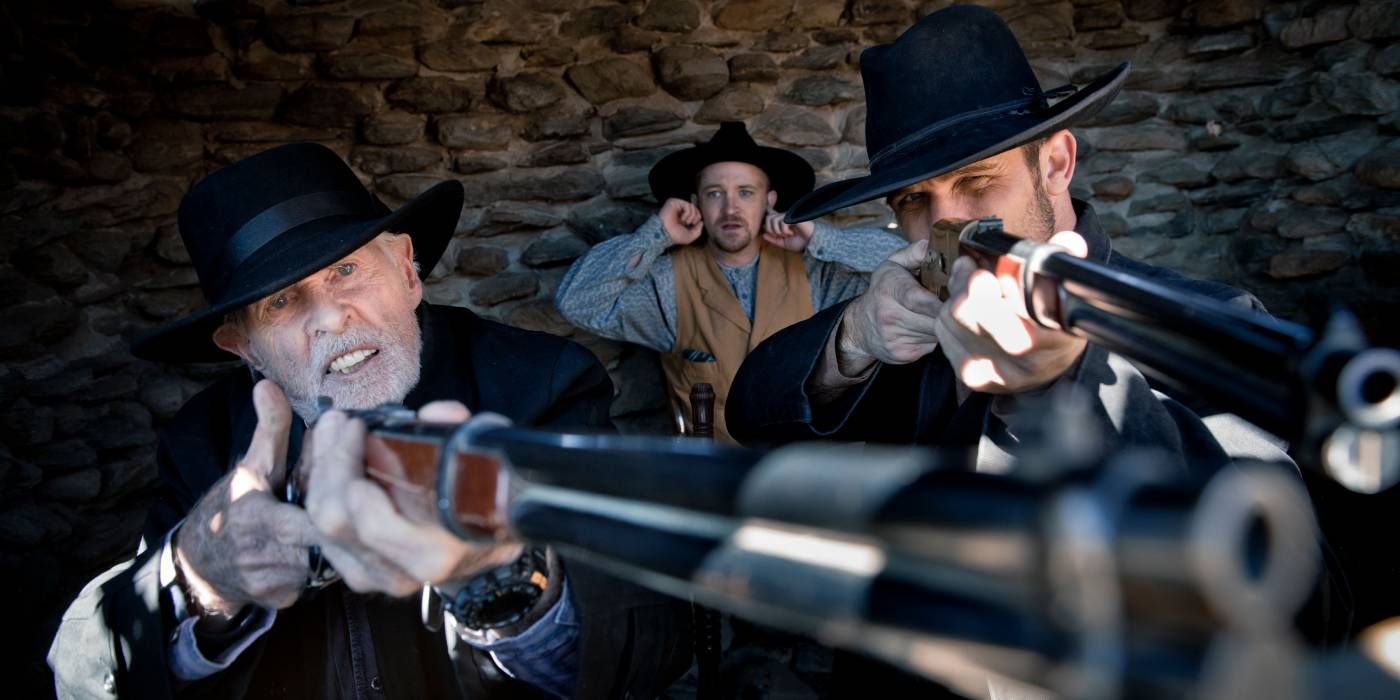When it comes to multi-generational Hollywood stars, Bruce Dern is one of the all-timers. In a career that stretches back decades, Dern's body of work has seen him collaborate with directors ranging from Alfred Hitchcock to Quentin Tarantino. His newest movie, the Western Last Shoot Out, arrives on VOD today.
In Last Shoot Out, Skylar Witte plays Jocelyn, who goes on the run after her father is murdered. She then crosses paths with Billy Tyson (Brock Harris), with the pair making a last stand in Billy's old outpost against the attacks of her father's killer Jody (Michael Welch). With Bruce Dern also bringing plenty of grit to the film, Last Shoot Out brings everything to the table that fans of Westerns love.
We speak to Bruce Dern on the making of Last Shoot Out, how it relates to Dern's long career in Hollywood, along with some of his acting philosophy when collaborating with co-stars and directors.
Screen Rant: How did you come aboard Last Shoot Out, and what can you share about the making of the movie?
Bruce Dern: Well, they come to me now and then to help get movies made. I’m 85, but I’m always interested in how people look at me in terms of casting. It always used to be very similar for about forty-five, fifty-five years, and then suddenly, about eight years ago, it changed when I got the role in Nebraska. People started looking at me as more of a lynchpin in their movies, but I enjoy movies like this. The director [Michael Feifer] was very good. He also helped me out since the Dodgers were also in the World Series at the time, so he kind of helped me out to finish up in time for that.
What I liked about the movie was that it had a couple of twists for an independent, small movie that made the script interesting to me. It’s not [different from] a lot of Westerns like Stagecoach or others that were made around a train station or a stagecoach depot where people are caught between places. In this particular circumstance, here’s a girl who tries to get away, and she’s going to try to marry my son, but it’s very clear she doesn’t want to. At the same time, it’s about family, and I enjoyed the ambition.
A lot of people ask me why I like doing movies like this, and it was really how I started. When I hit my stride in my early days in Hollywood, these were the kinds of movies Roger Corman made. Everybody in my age group didn’t finish college, but we did go to the University of Corman, and we learned how to make a movie in ten days for $295,000. In those days, you didn’t need permits to shoot in Hollywood or on the streets or anything like that. We just got it done, and I appreciate the fact that that’s still out there.
The other actors are also enormously complimentary to me and the things that I’ve done, but I’m always more interested in what they’re doing today to get the work in the first place. One thing I like to tell people is that there’s one thing you have that nobody else does, and that’s you. You’ve got about two and half minutes to leave a piece of yourself, and they might not tell you you’re right for the part, but they won’t forget that they got a peek into your heart and who you are. I did a documentary about fifteen years ago called A Decade Under The Influence, which had writers, actors, directors, and producers from the 70s, and they asked me, "When are you going to retire?" And I said, "I’m going to go because that’s all I know how to do."
When you were making Last Shoot Out, did you have to deal with the pandemic at all?
Bruce Dern: No, it was October of 2019, so we didn’t have to deal with it. I’ve had to on projects since then, like on the Amazon series Goliath. We started in January 2020 then had to stop in March, then we were able to start again in September and finished in December.
I also want to thank you, because we’re still finding ways to express stories, and if there’s one thing I miss in the business today, I miss the fact that there’s no reverence for what went before.
On that note, is that something that you found in Last Shoot Out that drew you to the film?
Bruce Dern: Well, I think once streaming came in, it was, "Get the product on film, and get it out", and that’s no different than Roger Corman or the way we did movies very quickly when I was starting out. But the difference is you don’t see as much respect for every single guild.
One story I could share about Mr. [Alfred] Hitchcock from the end of the first day of shooting Family Plot, Mr. Hitchcock went to the first assistant and said, "I would like a word with the crew", and he said, "Yes, sir." And Mr. Hitchcock sat on his high director’s chair and said, "Ladies and gentlemen, I’d just like to thank all of you for quite a wonderful first day." And they all thought he was thanking everybody and he said, "No, personally", and he went around the set and thanked every single, individual crew member by their first name, and that’s what you miss.
There’s still innovation being done, and Michael on Last Shoot Out had that in mind, and he was crunched for time and everything else. But he was very well-prepared, and he got it done. That’s basically been the motto of myself and people like Jack [Nicholson], Ellen Burstyn, and a lot of our generation - just get it done.
What was it like working with the cast of Last Shoot Out, people like Brock Harris, Skylar Witte, and Cam Gigandet?
Bruce Dern: They were all really eager, but one thing is that until the switch gets turned on, I don’t rehearse, for two reasons. One is I don’t want the other actors to anticipate where I’m coming from, and secondly, they have to really look and really listen. When you rehearse, you’re already letting them hang onto things that aren’t really happening, because it’s a rehearsal.
A perfect example of that is Once Upon A Time In Hollywood when Brad Pitt comes in to try and wake me up. Quentin [Tarantino] allows me to put in "Dernsies", which are little things that aren’t on the written page but they enhance a little glimpse into another part of the character. So, Brad comes to wake me up, and I act like I don’t know what’s going on. Brad stopped said he wasn’t prepared for that. He told me later on, "That’s what you’ve been doing all these years, and that’s why we really accept that you’re the character!" I’m always excited to see what these other kids might come up with and might do if they have someone who’s on the same page they are and can make them take their time to really look and really listen, it’ll be real behavior and that’s exciting to me.
What other projects do you have coming up after Last Shoot Out?
Bruce Dern: Well, I have Goliath that’s on now, and I did a movie called Reminisce, that deals with Dissociative Identity Disorder (DID). We did it this summer and I suppose it’ll come out next year. I have a few others that are out or coming out. This year, I’ve done six movies and a series, so I’m active, I’m excited because I’m not looking to quit or get out. What’s exciting still about film for me is working with other actors and looking like we’re all going through a life experience together.
Last Shoot Out is now out on VOD


